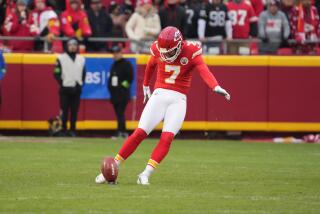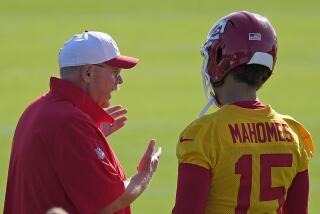NFL : Singletary Calls State Gambling a Bad Bet
- Share via
In various legislative halls, a lot of politicians have been talking lately about legalizing state-run betting on football games. And that makes Chicago Bear linebacker Mike Singletary “both sad and mad,” he said the other day.
“I’m saddened to hear that they want to take more money away from poor people,” said Singletary, who emerged this year as the NFL’s leading opponent to gamblers and gambling.
“And I’m mad that they’re so insensitive to the integrity of the game. Widespread betting would make sports fans suspicious of every fumble, every missed tackle, every mistake. Why take a great game and ruin it?”
Singletary, one of football’s foremost middle linebackers, doubled as an anti-gambling spokesman in Washington this summer, testifying at Senate hearings.
“There is no greater threat to (sports) in the development of our youth than state-legalized sports gambling,” he told the senators.
Doesn’t everybody gamble? he was asked.
“Bookmakers and professional gamblers are self-serving people who inflate the statistics wildly,” Singletary said. “They don’t know how much money is illegally bet. They say it’s in the billions for two reasons.
“They want to create a perception that other people are as deranged as they are. And they want to create more money for themselves.”
The big losers in state-supported gambling are the people who can’t afford to “throw away the money they’ve worked hard for,” Singletary said.
“The state’s true role is to be a referee, to help keep people honest. When the state becomes one of the players--in a lottery or sports gambling--it sends the wrong message to the millions of people who are already disadvantaged.
“The state’s message is: ‘Have confidence in us that you, too, can be rich if you’ll just give us your dimes and your dollars. Dream that you’re rich, and you can make yourself rich.’
“The state says, ‘Have fun, have a ball,’ but it’s sad. So sad.”
For-real offense: The Houston Oilers’ run-and-shoot offense has made a believer of former quarterback Pat Haden, the TNT analyst on Sunday night football.
Back at his Southland law office Monday after working the Dallas-Houston exhibition, Haden said: “I was a skeptic last year, but the Oilers have convinced me that they can do all the things that their (detractors) said they couldn’t. They can score in bad weather, they can score inside the 20, they can (control) the ball.
“The run-and-shoot is a viable offense, especially with a quarterback like Warren Moon. The Oilers have proved it.”
But as a Super Bowl contender, the Oilers have insufficient defense. Can their high-scoring offense overcome their defense?
“I doubt it,” Haden said. “It’s defense that wins (Super Bowl) games.”
Even if the Oilers shoot themselves defensively, their run-and-shoot offense will be blamed for their troubles, as a new offense often is.
For example, after the Detroit Lions’ defense failed last year in a 6-10 season, the front office forced out run-and-shoot coordinator Mouse Davis.
It’s an old NFL story. If you do something new, you better win.
The comrades: The San Francisco 49ers say they aren’t worrying about the tendinitis in Joe Montana’s throwing elbow.
But there are lingering concerns about their offensive line without overweight tackle Bubba Paris and about their secondary without safety Ronnie Lott, who is starting for the Raiders.
Before Monday night’s San Diego exhibition, 49er Coach George Seifert said “It remains to be seen” if either department is as strong as last year’s.
“One thing I feel good about is the improved camaraderie of the offensive line,” Seifert said. “There’s more than we had last year--and that’s one thing you’ve got to have.”
Another is talent. With Paris on the sideline, however, there isn’t much depth behind tackles Steve Wallace and Harris Barton. The 49ers were strongest in their Super Bowl years when Paris alternated with Wallace.
As for the club’s defensive backs, Seifert said: “I like the total way they’re playing together, but the starters are still up in the air.”
In Lott’s position at free safety, the 49ers have been starting Johnnie Jackson, a college cornerback at Houston, who was drafted fifth in 1989. They have moved Dave Waymer, the 12-year veteran from New Orleans, to strong safety.
They’re not sure that either is the answer.
The 46th man: In addition to the 45 players that each team will be permitted to suit up each week for NFL games this season, it can designate, under a new rule, a third quarterback as its “46th player.”
Another (47th) player will be designated inactive.
Joe Browne, an NFL vice president, makes some of the pertinent stipulations:
--On his first play, the 46th man must line up in a normal quarterback position, where “he may run, pass, quick-kick or catch a pass.”
--Thereafter, “he is also eligible to (punt, kick, or hold).”
--If he enters as the 46th man, a player who commonly plays another position can participate only at quarterback on his first play, and subsequently only at quarterback and in the kicking game.
--”The (first two quarterbacks) may not return to the game under any circumstances.”
Thus, presumably, if the Raiders fall far enough behind this year, or sail far ahead, they can bench Jay Schroeder and Steve Beuerlein in order to try out 46th man Todd Marinovich.
Watch for it.
All in the head: Erik Howard, the New York Giants’ respected nose tackle, missed a month of training camp last year and still made the Pro Bowl.
This year he held out for 27 days. And when he came in, Howard contributed something more to the exhibition season’s literature.
“Training camp is a lot more valuable for some positions than others,” he said. “Quarterbacks, wide receivers and running backs need to work on their timing.”
What about linemen?
“As a defensive lineman,” he said, “you don’t forget how to hit.”
The dreamer: Joe Gibbs, the Washington Redskins’ coach who sleeps in his office three times a week, is punching some holes in the assumption that all he knows and thinks is football.
A 1950s drag racer in his teen-age days at Santa Fe Springs, Gibbs has formed a NASCAR racing team with seven cars, a prominent driver--Dale Jarrett, who finished first in Michigan Sunday--and two goals: to win the Super Bowl in January and the Daytona 500 in February.
“There are very few times when somebody gets to live two dreams,” he said after lining up five sponsors for his Daytona operation, including a hotel chain and an auto manufacturer.
“When you get something (new) that’s exciting, it makes everything else seem much more exciting.”
Never as one-dimensional as he seems, Gibbs is also a former seniors’ national champion in racquetball.
But like others in his age group, Gibbs, 51, was attacked this year by nostalgia.
“When I was growing up in the ‘50s, it was cars and hamburger joints,” he said. “It was a great time, very exciting.”
And now?
“I had a fantasy of getting back into racing cars,” he said. “There’s a time in life you either grab a dream or let it slide by, and I grabbed it.”
Quote Department:
Eugene Lockhart, New England linebacker, on being traded from the Dallas Cowboys: “(Football) is a cold business, a cold, cold business, and it’s even colder in New England.”
Reggie White, the preacher who doubles as an all-pro defensive lineman for the Philadelphia Eagles, on what he tells youth groups: “Boys need to treat girls with respect. The most precious thing to (a girl) is virginity. When a guy tells you, ‘I love you,’ they’re just out for themselves.”
Roy Green, the Cleveland Browns’ new receiver, on why he thinks speed is overrated in the art of catching long passes: “Mainly, you have to know how to set up defensive backs.”
Roy Green (one day later): “Maybe I’ve lost a step, but I had a few to lose.”
More to Read
Go beyond the scoreboard
Get the latest on L.A.'s teams in the daily Sports Report newsletter.
You may occasionally receive promotional content from the Los Angeles Times.










